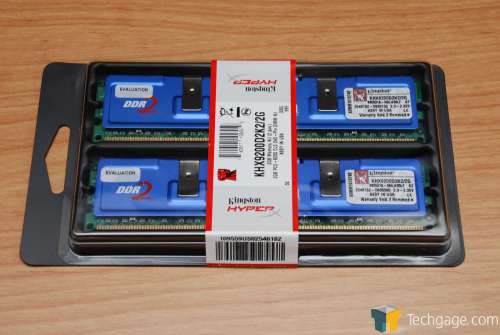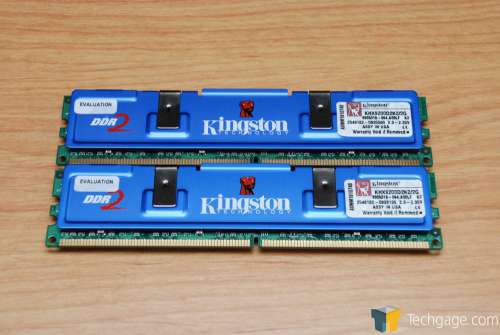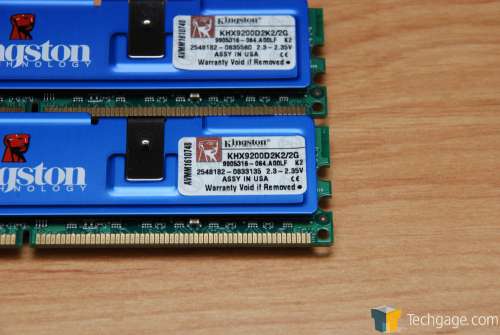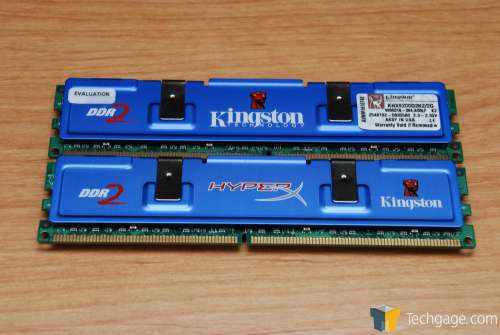- Qualcomm Launches Snapdragon 4 Gen 2 Mobile Platform
- AMD Launches Ryzen PRO 7000 Series Mobile & Desktop Platform
- Intel Launches Sleek Single-Slot Arc Pro A60 Workstation Graphics Card
- NVIDIA Announces Latest Ada Lovelace Additions: GeForce RTX 4060 Ti & RTX 4060
- Maxon Redshift With AMD Radeon GPU Rendering Support Now Available
Kingston 2GB HyperX PC2-9200
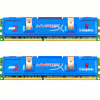
Kingston is not willing to allow other performance memory companies hog all the limelight. Their current line-up proves that point well. Today we are taking a look at their screaming fast PC2-9200 ram. Let’s see how it compares to the competition.
Page 1 – Introduction
|
|
The memory market is constantly moving and leaves the customer to make a tough choice. It’s hard to wade through all those kits on your favorite e-tailers site and know which is the best. That’s why we evaluate them for you, so you have a good idea before handing over a few Benjamins. If you are not into overclocking, the choice is made easier though. Find the right price and one with a heatspreader you like and you should be golden. Of course, warranties could come into play as well.
We’ve taken a look at close to thirty kits of memory in our two years of existence. Some from OCZ, some from Corsair and the rest from other smaller known companies. Today we are taking a look at a new kit from Kingston and although they are far from being unknown, they are not usually the first choice when it comes to performance memory. Kingston is actually larger than Corsair and OCZ combined, so you’d imagine they have a solid grasp on how to make good memory with quality, high-binned chips.
A few weeks ago, Greg took a look at their PC2-6400 HyperX kit which left us impressed. It overclocked quite high considering it had only a 400MHz stock frequency. Last year I had taken a look at their PC2-8000 and was left equally impressed. In fact, it’s been in one of my machines since that review. That said, Kingston has not let us down yet, so we are expecting great things from their PC2-9200 kit.
Before we dive into this specific kit, we should cover a few other aspects. This is not Kingstons top-end kit, despite the already extreme clocks. No, instead that place is left to their PC2-9600 kit, clocked at an even 600MHz. Both the 9200 and 9600 kits have the same stock timings and voltage requirements. The 9600 simply has better chips. But here’s the funny thing. Kingston sells the 9200 kit for $455 and the 9600 kit for only $5 more. Seem strange? It does to me. I’d opt for the higher kit if you are going to splurge on a kit like this, simply because you are gaining 25MHz for an additional 1% of the price.
I will mention though, Kingstons store was the highest priced I found, which isn’t much of a surprise. There may be larger differences in the prices through other e-tailers, so you will want to do some shopping around.
The PC2-9200 kit arrived in the same plastic blister pack that Kingston have used for a while. I have to say, this is the -best- blister pack on the market. It tightly contains the memory and is securely shut with the information sticker. Your memory is it’s safest when in this pack.
We’ve come to expect the navy blue spreaders from Kingston, and they plan on keeping them around for a while. I actually like the color and design quite a bit. Simple, but it works.
Taking a close look at the sticker, we can see the serial code, model number and the word “Assy”. Kingston is the only company I know of off-hand that actually puts the required voltage on the sticker. This saves people from having to go to their website to find out that simple, yet important fact. I strongly believe other companies should start doing this. It just makes sense.
Both the front and back look identical except for the logo in the center.
Overall I like the look of the modules. Simple, but sweet. Green PCB is boring, but black wouldn’t go that well with those blue heat spreaders, so I can’t complain much there. Thats an idea though… blue memory PCB. That I’d like to see.
With our introductions out of the way, we can move on in to overclocking.
|
|
Support our efforts! With ad revenue at an all-time low for written websites, we're relying more than ever on reader support to help us continue putting so much effort into this type of content. You can support us by becoming a Patron, or by using our Amazon shopping affiliate links listed through our articles. Thanks for your support!




